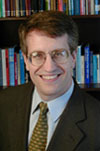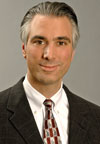The High Tech Law Institute and the BroadBand Institute of California present
Carterfone
and Open Access in the Digital Era
speaker bios
watch powerpoints
listen to podcasts
The FCC’s 1968 Carterfone decision—celebrating its 40th anniversary this year—is frequently cited in policy discussions about Net Neutrality and open access, but there is little consensus about how its provisions should apply to Internet access providers and emerging communications technologies. This Symposium will gather leading telecommunications policy experts to explore the opinion’s implications—past, present, and future—on communications policy.
Attendance is free and open to the public. Five plus hours of CLE are also available to attorneys at HTLI benefactor firms and in-house counsel for free, to Santa Clara Law alumni for $50, and to everyone else for $100. Santa Clara Law is a State Bar of California approved MCLE provider.
Policy Statements, Rules, and Wireless Carterfone
Marvin Ammori
Assistant Professor, University of Nebraska, Lincoln
Faculty Advisor of UNL Space & Telecomm Program
 Professor Ammori’s scholarly research focuses on how communications, information, and media policies affect the distribution of political and economic power and whether those policies serve or fail to promote innovation and to serve the values underlying freedom of speech and press.
Professor Ammori’s scholarly research focuses on how communications, information, and media policies affect the distribution of political and economic power and whether those policies serve or fail to promote innovation and to serve the values underlying freedom of speech and press.
Before coming to Nebraska, Professor Ammori served as General Counsel of Free Press and practiced as an advocate in Washington, DC, where he was centrally involved in many of the most prominent media and Internet policy debates, including network neutrality, broadcast ownership limits, children’s media rules, wireless policy, and access for all Americans to high-speed internet. He served successfully as the lead counsel for consumer groups and scholars in related FCC proceedings (prompted by filings he authored) that resulted in a landmark decision regarding Internet freedom and FCC jurisdiction. As General Counsel for Free Press and as a staff attorney at Georgetown University LawCenter’s Institute for Public Representation, he practiced before appellate courts, the Federal Communications Commission, and Congress. Previously, Professor Ammori practiced at a corporate law firm in Chicago and held a research fellowship at Yale Law School, with its Information Society Project.
Carterfone: Precedent, Principle, Neither, or Both
George Ford
Chief Economist
Phoenix Center for Advanced Legal and Economic Public Policy Studies
 George Ford is the Chief Economist and co-founder of the Phoenix Center for Advanced Legal & Economic Public Policy Studies in Washington, D.C. (U.S.A.). Dr. Ford has a Ph.D. in Economics and has served as a professional economist at the Federal Communications Commission and in the private sector for telecommunications firms both big and small. Dr. Ford has testified as an expert before many state regulatory commissions and the U.S. Congress. His research has been published in academic journals including the Journal of Law and Economics, Empirical Economics, the Journal of Business, the Antitrust Bulletin, the Journal of Regulatory Economics, and other legal and economic scholarly outlets. Much of his research has focused on the application of economics and econometrics to public policy issues. Dr. Ford has (co)authored three recent papers on the application of Carterfone regulations to the wireless industry: Consumers and Wireless Carterfone: An Economic Perspective, Using Auction Results to Forecast the Impact of Wireless Carterfone Regulation on Wireless Networks, and Wireless Net Neutrality: From Carterfone to Cable Boxes, all available at www.phoenix-center.org.
George Ford is the Chief Economist and co-founder of the Phoenix Center for Advanced Legal & Economic Public Policy Studies in Washington, D.C. (U.S.A.). Dr. Ford has a Ph.D. in Economics and has served as a professional economist at the Federal Communications Commission and in the private sector for telecommunications firms both big and small. Dr. Ford has testified as an expert before many state regulatory commissions and the U.S. Congress. His research has been published in academic journals including the Journal of Law and Economics, Empirical Economics, the Journal of Business, the Antitrust Bulletin, the Journal of Regulatory Economics, and other legal and economic scholarly outlets. Much of his research has focused on the application of economics and econometrics to public policy issues. Dr. Ford has (co)authored three recent papers on the application of Carterfone regulations to the wireless industry: Consumers and Wireless Carterfone: An Economic Perspective, Using Auction Results to Forecast the Impact of Wireless Carterfone Regulation on Wireless Networks, and Wireless Net Neutrality: From Carterfone to Cable Boxes, all available at www.phoenix-center.org.
Hold The Phone: Assessing the Rights of Wireless Handset Owners and the Network Neutrality Obligations of Carriers
Rob Frieden
Pioneers Chair and Professor of Telecommunications and Law
Penn State University
 Rob Frieden serves as Pioneers Chair and Professor of Telecommunications and Law at Penn State University. He also provides legal, management and market forecasting consultancy services and has written several books, published over fifty articles in academic journals and provided commentary in a variety of media. Professor Frieden updates a major communications treatise: All About Cable (Law Journal Press) and has presented papers and moderated sessions in numerous forums throughout the world.
Rob Frieden serves as Pioneers Chair and Professor of Telecommunications and Law at Penn State University. He also provides legal, management and market forecasting consultancy services and has written several books, published over fifty articles in academic journals and provided commentary in a variety of media. Professor Frieden updates a major communications treatise: All About Cable (Law Journal Press) and has presented papers and moderated sessions in numerous forums throughout the world.
Before accepting an academic appointment, Professor Frieden provided a broad range of business development, strategic planning, policy analysis and regulatory functions for the IRIDIUM mobile satellite venture.
Professor Frieden has held senior policy making positions in international telecommunications at the United States Federal Communications Commission and the National Telecommunications and Information Administration. In the private sector, he practiced law in Washington, D.C., and served as Assistant General Counsel at PTAT System, Inc. where he handled corporate, transactional and regulatory issues for the nation’s first private undersea fiber optic cable company. Professor Frieden holds a B.A., with distinction, from the University of Pennsylvania (1977) and a J.D. from the University of Virginia (1980).
The Intelligent Network Redux
Allen S. Hammond IV
Phil and Bobbie Sanfilippo Chair and Professor of Law at Santa Clara Law;
Director of the Broadband Institute of California
 Allen S. Hammond IV holds the Phil and Bobbie Sanfilippo Chair at Santa Clara University. A professor at Santa Clara Law since 1998, he serves as director of the Broadband Institute of California, is former President of the Alliance for Public Technology, director of the Law and Public Policy Program at the Center for Science Technology and Society at Santa Clara University, and is a board member and past chair of the AT&T Telecommunications Consumer Advisory Panel. He is the author of many articles and the editor, with Barbara S. Cherry and Stephen S. Wildman, of Making Universal Service Policy: Enhancing the Process Through Multidisciplinary Evaluation (Lawrence Erlbaum Associates, 1999). He earned his J.D. from the University of Pennsylvania School of Law, his M.A. from the Annenberg School of Communications at the University of Pennsylvania, and his B.A. from Grinnel College.
Allen S. Hammond IV holds the Phil and Bobbie Sanfilippo Chair at Santa Clara University. A professor at Santa Clara Law since 1998, he serves as director of the Broadband Institute of California, is former President of the Alliance for Public Technology, director of the Law and Public Policy Program at the Center for Science Technology and Society at Santa Clara University, and is a board member and past chair of the AT&T Telecommunications Consumer Advisory Panel. He is the author of many articles and the editor, with Barbara S. Cherry and Stephen S. Wildman, of Making Universal Service Policy: Enhancing the Process Through Multidisciplinary Evaluation (Lawrence Erlbaum Associates, 1999). He earned his J.D. from the University of Pennsylvania School of Law, his M.A. from the Annenberg School of Communications at the University of Pennsylvania, and his B.A. from Grinnel College.
Carterfone: Present at the Creation
Nicholas Johnson
University of Iowa College of Law
 Why is Nicholas Johnson here? Because, as it happens, among his 400 dissenting opinions as an FCC commissioner there were two majority opinions, one of which was Carterphone. After graduating from the University of Texas Law School, and a clerkship with Justice Hugo L. Black, he began his teaching career at the University of California, Berkeley, Law School. If you’d like to know more about him before and since – indeed more than even his mother would ever have wanted to know – check the lengthy bios and bibliographies on his Web page, www.nicholasjohnson.org, and his blog, FromDC2Iowa.blogspot.com. This year he’s published two books, “Your Second Priority” (media reform) and “Are We There Yet?” (political reform).
Why is Nicholas Johnson here? Because, as it happens, among his 400 dissenting opinions as an FCC commissioner there were two majority opinions, one of which was Carterphone. After graduating from the University of Texas Law School, and a clerkship with Justice Hugo L. Black, he began his teaching career at the University of California, Berkeley, Law School. If you’d like to know more about him before and since – indeed more than even his mother would ever have wanted to know – check the lengthy bios and bibliographies on his Web page, www.nicholasjohnson.org, and his blog, FromDC2Iowa.blogspot.com. This year he’s published two books, “Your Second Priority” (media reform) and “Are We There Yet?” (political reform).
Carterfone Principles and Competition Policy
Christopher Libertelli
Skype
 Christopher Libertelli is Senior Director of Government and Regulatory Affairs for Skype, a global Internet communications company, where he oversees initiatives to drive public policies that protect the use of innovative technologies. In this role, he has appeared in front of regulatory and legislative bodies in the U.S., European Union and Canada.
Christopher Libertelli is Senior Director of Government and Regulatory Affairs for Skype, a global Internet communications company, where he oversees initiatives to drive public policies that protect the use of innovative technologies. In this role, he has appeared in front of regulatory and legislative bodies in the U.S., European Union and Canada.
He is responsible for developing and filing Skype’s Wireless Carterfone petition with the U.S. Federal Communications Commission (FCC) in February of 2007. The goal of this petition is to protect Skype users’ right to connect to each other when they are using a mobile phone or PDA on the Internet. It calls upon the FCC to establish an open environment where any application can be loaded on any mobile device on any wireless network. In addition, he is an outspoken proponent of Net Neutrality, having frequently spoken and presented on this topic.
Before joining Skype in July of 2005, he was Senior Legal Advisor to U.S. FCC Chairman Michael Powell. From July 2001 until March 2005, he managed the Chairman’s broadband and competition policy agendas and was central to the development of the FCC’s Internet Policy Statement and Internet Telephony framework, pieces of which formed the intellectual and legal basis for the Wireless Carterfone petition. In this capacity, he worked closely with federal and state regulators and Congress in the context of telecommunications reform efforts.
He also held a number of senior positions at the FCC, including special counsel for competition policy, and has published widely in the areas of telecommunications policy and regulation. Before joining the FCC, he represented competitive local exchange carriers and wireless providers in private practice at the law firm of Dow, Lohnes and Albertson in Washington, D.C.
Libertelli has a J.D. in Communications Law from Boston University. When he is not traveling for Skype, he lives and works in Washington D.C.
Carterfone and the Wireless World — Is There Enough Competition?
Gregory Rosston
Stanford Institute for Economic Policy Research
 Gregory L. Rosston is Deputy Director of the Stanford Institute for Economic Policy Research and Deputy Director of the Public Policy program at Stanford University. He is also a Lecturer in Economics and Public Policy at Stanford University where he teaches courses on competition, antitrust, regulation, and economics of the Internet. Dr. Rosston served as Deputy Chief Economist at the Federal Communications Commission working on the implementation of the Telecommunications Act of 1996 and he helped to design and implement the first ever spectrum auctions in the United States.
Gregory L. Rosston is Deputy Director of the Stanford Institute for Economic Policy Research and Deputy Director of the Public Policy program at Stanford University. He is also a Lecturer in Economics and Public Policy at Stanford University where he teaches courses on competition, antitrust, regulation, and economics of the Internet. Dr. Rosston served as Deputy Chief Economist at the Federal Communications Commission working on the implementation of the Telecommunications Act of 1996 and he helped to design and implement the first ever spectrum auctions in the United States.
Dr. Rosston received his Ph.D. in Economics from Stanford University and his A.B. with Honors in Economics from University of California at Berkeley. He also serves as an advisory board member for Sustainable Conservation and the Nepal Youth Opportunity Fund.
Internet Myth-Busting
Catherine J. K. Sandoval
Assistant Professor of Law
Santa Clara Law
 Professor Sandoval’s research interests involve business and public interest issues including the effect of securities reform legislation; communications business and regulatory issues, and anti-trust market definition and market-entry issues.
Professor Sandoval’s research interests involve business and public interest issues including the effect of securities reform legislation; communications business and regulatory issues, and anti-trust market definition and market-entry issues.
Professor Sandoval also has a high interest in policy research in international telecommunications development law and policy. She has drafted speeches and text for international telecommunications accords. She is also interested in the relationship between communications, transportation and housing infrastructure policies.
Carterfone, Competition and the First Amendment
Andrew Schwartzman
Media Access Project
 Andrew Jay Schwartzman has directed Media Access Project (MAP) since June, 1978. He is recognized as one of the leading media attorneys and has appeared on behalf of MAP before the Congress, the FCC and the courts on issues such as cable TV regulation, minority and female ownership and employment in the mass media, “equal time” laws and network neutrality.
Andrew Jay Schwartzman has directed Media Access Project (MAP) since June, 1978. He is recognized as one of the leading media attorneys and has appeared on behalf of MAP before the Congress, the FCC and the courts on issues such as cable TV regulation, minority and female ownership and employment in the mass media, “equal time” laws and network neutrality.
Mr. Schwartzman teaches in Johns Hopkins University School of Arts and Sciences’ Communication in Contemporary Society Program. He was the Distinguished Lecturer in Residence at the Southwestern Law School’s National Entertainment & Media Law Institute’s program at Fitzwilliam College, Cambridge.
The Use and Abuse of “The Carterfone Principle”
James B. Speta
Professor of Law
Northwestern School of Law
 Jim Speta’s research interests include telecommunications and Internet policy, antitrust, administrative law, and market organization. He teaches both at Northwestern Law School and in the Joint Program in Law and Business operated by the Law School and the Kellogg School. A 1991 graduate of the University of Michigan Law School, Speta joined the Northwestern faculty following a one-year visit. He had previously clerked for Judge Harry T. Edwards on the United States Court of Appeals for the D.C. Circuit and practiced appellate, telecommunications, and antitrust law with the Chicago firm of Sidley & Austin.
Jim Speta’s research interests include telecommunications and Internet policy, antitrust, administrative law, and market organization. He teaches both at Northwestern Law School and in the Joint Program in Law and Business operated by the Law School and the Kellogg School. A 1991 graduate of the University of Michigan Law School, Speta joined the Northwestern faculty following a one-year visit. He had previously clerked for Judge Harry T. Edwards on the United States Court of Appeals for the D.C. Circuit and practiced appellate, telecommunications, and antitrust law with the Chicago firm of Sidley & Austin.
Carterfone and Standardization
Kevin Werbach
Assistant Professor of Legal Studies and Business Ethics
The Wharton School, University of Pennsylvania
 Kevin Werbach is Assistant Professor of Legal Studies and Business Ethics at The Wharton School, University of Pennsylvania. His research explores the legal and business issues surrounding the Internet and other emerging technologies. He is also the founder of the Supernova Group, a technology analysis and consulting firm, and organizer of Supernova www.supernova2008.com, a leading executive technology conference.
Kevin Werbach is Assistant Professor of Legal Studies and Business Ethics at The Wharton School, University of Pennsylvania. His research explores the legal and business issues surrounding the Internet and other emerging technologies. He is also the founder of the Supernova Group, a technology analysis and consulting firm, and organizer of Supernova www.supernova2008.com, a leading executive technology conference.
Formerly, Werbach was the Editor of Release 1.0, a renowned monthly technology report published by Esther Dyson. He also served as Counsel for New Technology Policy at the Federal Communications Commission, where he helped develop the US Government’s Internet and e-commerce policies. He is frequently quoted by leading media outlets, has testified before the US Senate and Federal Communications Commission, and is the author of numerous academic and popular publications.
Powerpoint presentations
Presentation by Marvin Ammori, University of Nebraska Lincoln College of Law
Presentation by Rob Frieden, Professor of Telecommunications and Law, Penn State University
Presentation by Nicholas Johnson, University of Iowa College of Law
Presentation by Christopher Libertelli, Skype
Presentation by Catherine Sandoval, Assistant Professor of Law, Santa Clara University
Presentation by James B. Speta, Northwestern University Law School
Presentation by Kevin Werbach, The Wharton School, University of Pennsylvania
Schedule:
8:15-8:45 Registration
8:45-9:00 Introduction (Goldman)
9:00-10:30 Panel 1: Carterfone and Network Design (moderator: Goldman)
- Hammond: “The Intelligent Network Redux”
- Sandoval: “Internet Myth-Busting”
- Werbach: Carterfone and standardization
10:30-11:00 Break
11:00-12:30 Panel 2: Carterfone and Technological Implementation (moderator: Hammond)
- Policy Statements, Rules, and Wireless Carterfone”
- Frieden: “Hold The Phone: Assessing the Rights of Wireless Handset Owners and the Network Neutrality Obligations of Carriers”
- Rosston: “Carterfone and the Wireless World – Is There Enough Competition?”
12:30-2:00 Lunch and Keynote
Introduction (Hammond)
Johnson: “Carterfone: Present at the Creation” (starts at 1:15)
2:00-2:15 Break
2:15-4:15 Panel 3: Carterfone and Regulatory Development (moderator: Sandoval)
- Ford: “Carterfone: Precedent, Principle, Neither, or Both”
- Libertelli: Carterfone Principles and Competition Policy
- Schwartzman: “Carterfone, Competition and the First Amendment.”
- Speta: “The Use and Abuse of ‘The Carterfone Principle'”
4:15-4:30 Closing remarks
4:30-5:15 Reception
We thank our benefactors for their support:
Blakely Sokoloff Taylor & Zafman · McDermott Will & Emery · Orrick Herrington & Sutcliffe · Schwegman Lundberg & Woessner · Wilson Sonsini Goodrich & Rosati · Fenwick & West · Cooley Godward Kronish